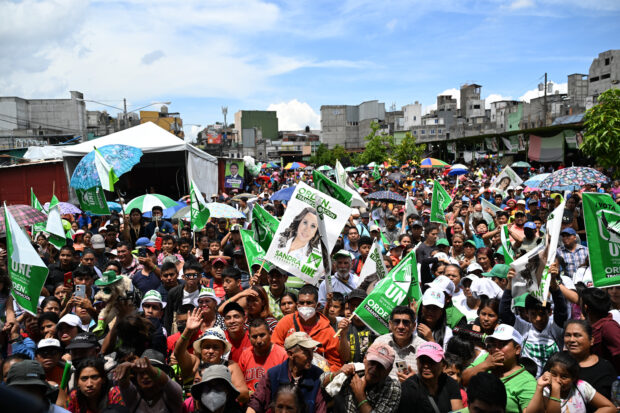Guatemala: Cradle of Mayan civilization ravaged by poverty, graft

Supporters of Guatemalan candidate for the National Union of Hope party and former First Lady (2008-2011), Sandra Torres, attend her closing campaign rally at La Terminal market in Guatemala City on June 23, 2023. AFP
GUATEMALA CITY — Central America’s most populous nation, Guatemala is scarred by civil war, gang violence and poverty, its people among the streams of migrants headed for the United States.
The country of more than 17 million heads to the polls on Sunday in a bid to put its troubled past behind it, though many voters say they doubt much will change.
Troubled past
Once a center of the Mayan civilization, Guatemala was ruled by Spain from 1524 until its independence in 1821.
Spanish remains its official language, but there are also 24 native languages, all but two of Mayan origin. Indigenous people make up some 42 percent of the population.
In 1954, the leftist government of freely-elected President Jacobo Arbenz Guzman was overthrown in a US-backed coup, leading to a string of pro-American, right-wing regimes and the outbreak of civil war.
Article continues after this advertisementFighting between government troops, left-wing rebels and right-wing vigilante groups ended with a peace accord in 1996.
Article continues after this advertisementSome 200,000 people died or were forcibly disappeared in more than three decades of conflict, more than 80 percent of them ethnic Mayans, according to United Nations figures. About 1.5 million people were displaced or exiled.
Military dictator Efrain Rios Montt, who ruled from 1982 to 1983, died in 2018 while on trial for genocide committed during the peak of the war. His daughter, Zury Rios, is now one of the leading presidential candidates.
Impoverished present
While Guatemala has the biggest economy of Central America’s seven countries, it also has some of the worst poverty, malnutrition and child mortality rates in Latin America, the World Bank says.
Economic growth came in at 4 percent in 2022 and is projected to drop to 3.2 percent in 2023. Textiles, coffee, sugar, silver and bananas are among the country’s main exports.
Nearly 60 percent of its population lives in poverty, most of them in rural and Indigenous areas.
One in two children under five suffer chronic malnutrition, according to UNICEF, and illiteracy is at nearly 20 percent, according to the 2018 census.
Remittances from Guatemalans abroad amounted to about 19 percent of GDP in 2022, more than exports.
Guatemala’s homicide rate, among the highest in the world, was 17.3 per 100,000 in 2022, according to the UN — about three times the global average.
Half of the killings were attributed to gang violence related to drug trafficking.
Crime and poverty push thousands to undertake the dangerous migrant journey each to the United States, passing through Mexico.
The foreign ministry estimates more than 2.8 million Guatemalans reside in the United States, around half a million legally.
Graft
President Alejandro Giammattei is finishing a constitutionally-limited single term marred by claims of widespread graft and the persecution of prosecutors and critical journalists.
Several former prosecutors of the International Commission against Impunity in Guatemala (CICIG), a UN-backed entity closed by the government in 2019, have since been arrested or forced into exile.
Earlier this month, the founder of a newspaper critical of the government was sentenced to six years in prison on charges of money laundering, charges dismissed as fabricated by press freedom groups.
The newspaper founded by Jose Ruben Zamora has been forced to close, and several of its journalists have fled the country.
Giammattei’s attorney general, Maria Consuelo Porras, is on a US list of “corrupt and undemocratic actors.”
‘Ring of Fire’
Bordering Mexico, Belize, Honduras and El Salvador, Guatemala is situated in the “Pacific Ring of Fire” — a vast region where around 85 percent of the world’s seismic activity is concentrated.
The Fuego volcano, 35 kilometers (22 miles) southwest of the capital, Guatemala City, erupted violently in 2018, spewing rivers of lava that devastated the village of San Miguel Los Lotes, killing 215 people.
Three other volcanoes surround its landmark Lake Atitlan, Guatemala’s most important tourist attraction, along with the city of Antigua.
Last year, the country received about 1.8 million foreign visitors, down from a record 2.5 million in 2019, before the pandemic.
Guatemala has produced two Nobel laureates: Miguel Angel Asturias for the literature prize in 1967, and Rigoberta Menchu for the peace prize in 1992.
RELATED STORIES